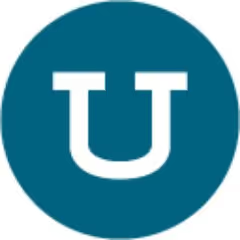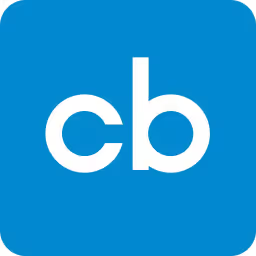Membrain Alternatives
Explore 10 Membrain alternatives. This guide offers a direct comparison of features, pricing, and use cases to help you choose the best platform.

You might be using Membrain for good reasons. It’s a strong tool to create and manage a consistent sales process. Many teams find it helps them execute their sales strategy effectively, which is exactly what it’s designed to do.
But no tool is perfect. Some users find the learning curve steep or wish for more integrations. We analyzed the best alternatives, comparing their pros and cons based on G2 reviews to help you choose. Let's get started.
11x: Digital Workers for Sales
If your goal is to add digital workers to your sales team, 11x offers autonomous agents. These agents handle tasks like lead research and outreach. This allows your human reps to focus on deals.
This approach suits teams that want to automate repetitive sales activities, not just manage a process. It presents a different view on sales team structure and efficiency.
11x provides a GTM platform with AI agents that handle your sales process. The agent Alice finds prospects, conducts outreach via email and LinkedIn, and maintains your CRM. Julian, another agent, qualifies inbound leads and books meetings.
The platform consolidates data enrichment, outreach, and email warmup, so separate point solutions are not needed.
Membrain Alternatives
The following section provides a detailed breakdown of ten Membrain alternatives. We analyze each tool's pricing, features, and its specific advantages and drawbacks in comparison to Membrain.
1) Salesforce Sales Cloud
Salesforce Sales Cloud is a widely used CRM platform. It provides a broad set of tools for sales operations, from contact management to sales forecasting. Its scope extends beyond just sales process management.
The platform is known for its extensive customization options and a large marketplace of third-party apps. This allows businesses to build a solution tailored to their specific needs, which differs from Membrain's focus on a structured sales process.
Some teams may find the platform's complexity and pricing to be a consideration. The extensive feature set can require significant setup and training, and costs can increase with more users and add-ons.
Salesforce suits large organizations that require a highly adaptable CRM at the core of their tech stack. Companies that prioritize a ready-to-use, sales-methodology-driven tool might find Membrain more aligned with their immediate goals.
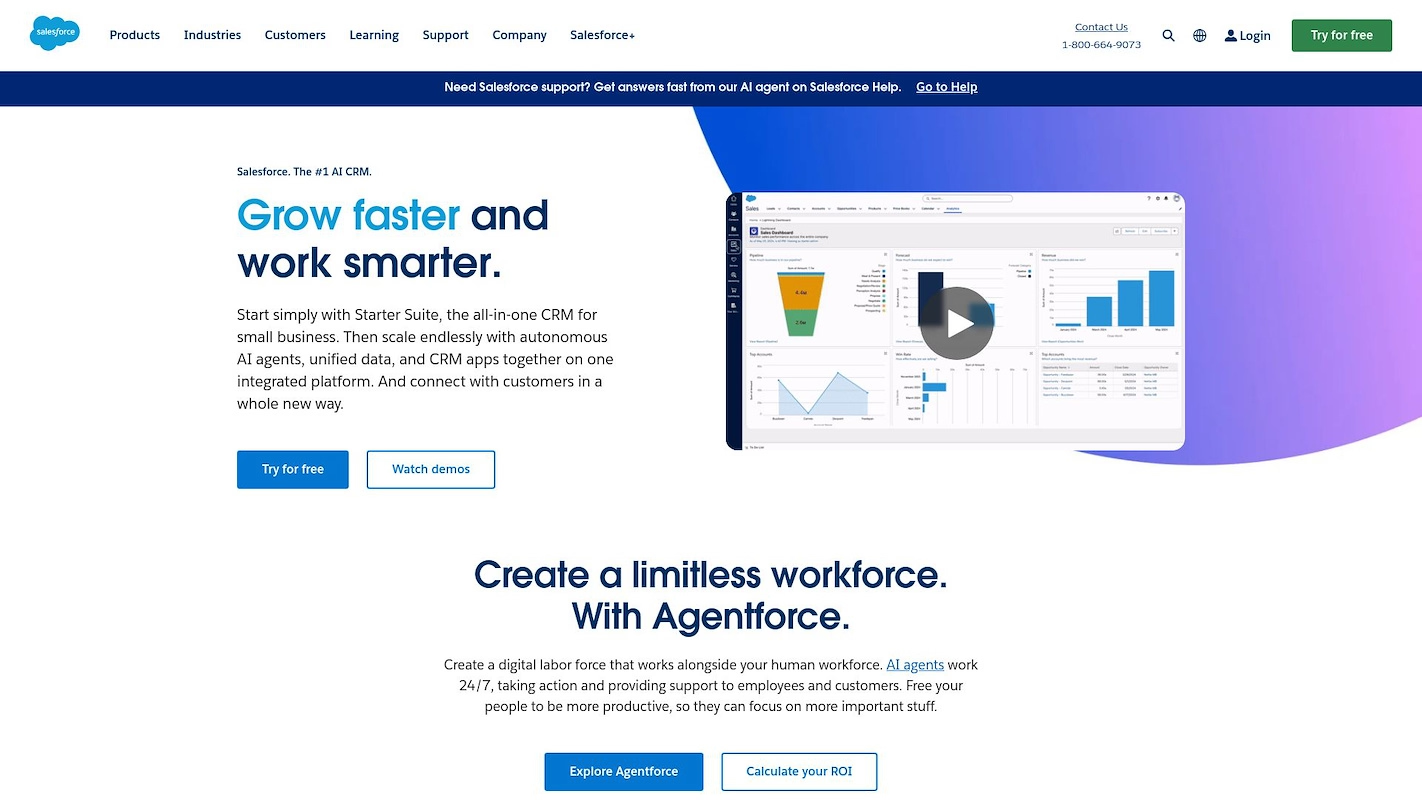
Salesforce Sales Cloud is an AI-powered sales automation platform built on the company's CRM. It unifies customer data, guides sellers with AI insights, and automates workflows. The system offers real-time visibility into pipelines and forecasts for businesses of any size.
It creates a single source of truth for sales activities. The platform uses AI to prioritize leads and automates quotes and contract approvals to shorten sales cycles.
Salesforce Sales Cloud's Main Features
- The platform includes a drag-and-drop flow builder to automate complex processes and territory assignments.
- It generates templated quotes that sync to opportunities and includes automated approval flows for contracts.
- A browser extension, mobile app, and Slack integration allow for collaboration and CRM updates from different devices.
How Salesforce Sales Cloud Compares to Membrain
Average Review Score: 4.4/5 stars based on 23,364 G2 reviews
- Salesforce Sales Cloud provides extensive customization options and a large app marketplace. This allows for a more tailored CRM setup compared to Membrain's focus on a structured sales methodology.
- It uses AI to automatically prioritize leads and offer sales insights. This differs from Membrain, which centers more on the manual execution of a defined sales process.
- The platform includes native marketing automation and customer support tools. This creates a more unified customer platform than Membrain's specific focus on sales team effectiveness.
- It offers built-in CPQ (Configure, Price, Quote) functionality. This automates complex quoting and contract approvals, a feature set not central to Membrain's core design.
Potential Drawbacks Compared to Membrain
- Some users report a steep learning curve due to the platform's extensive customization options. This differs from Membrain, which provides a more structured, methodology-driven framework that can be faster for teams to adopt.
- The total cost can become significant, as pricing increases with more users and necessary add-ons. Teams may find Membrain's specialized toolset offers a more predictable cost for its specific function.
- It requires teams to build their sales processes from the ground up within the platform. This is different from Membrain, which is designed around a built-in sales process and coaching framework to guide sellers.
Pricing and Cost Considerations
Salesforce Sales Cloud pricing starts at $25 per user per month and increases to $330 for its Unlimited Edition. Membrain does not list its pricing publicly, requiring a custom quote. This makes Salesforce's entry-level plans more transparent, while Membrain's model is likely tailored to specific organizational needs through direct sales contact.
2) HubSpot Sales Hub
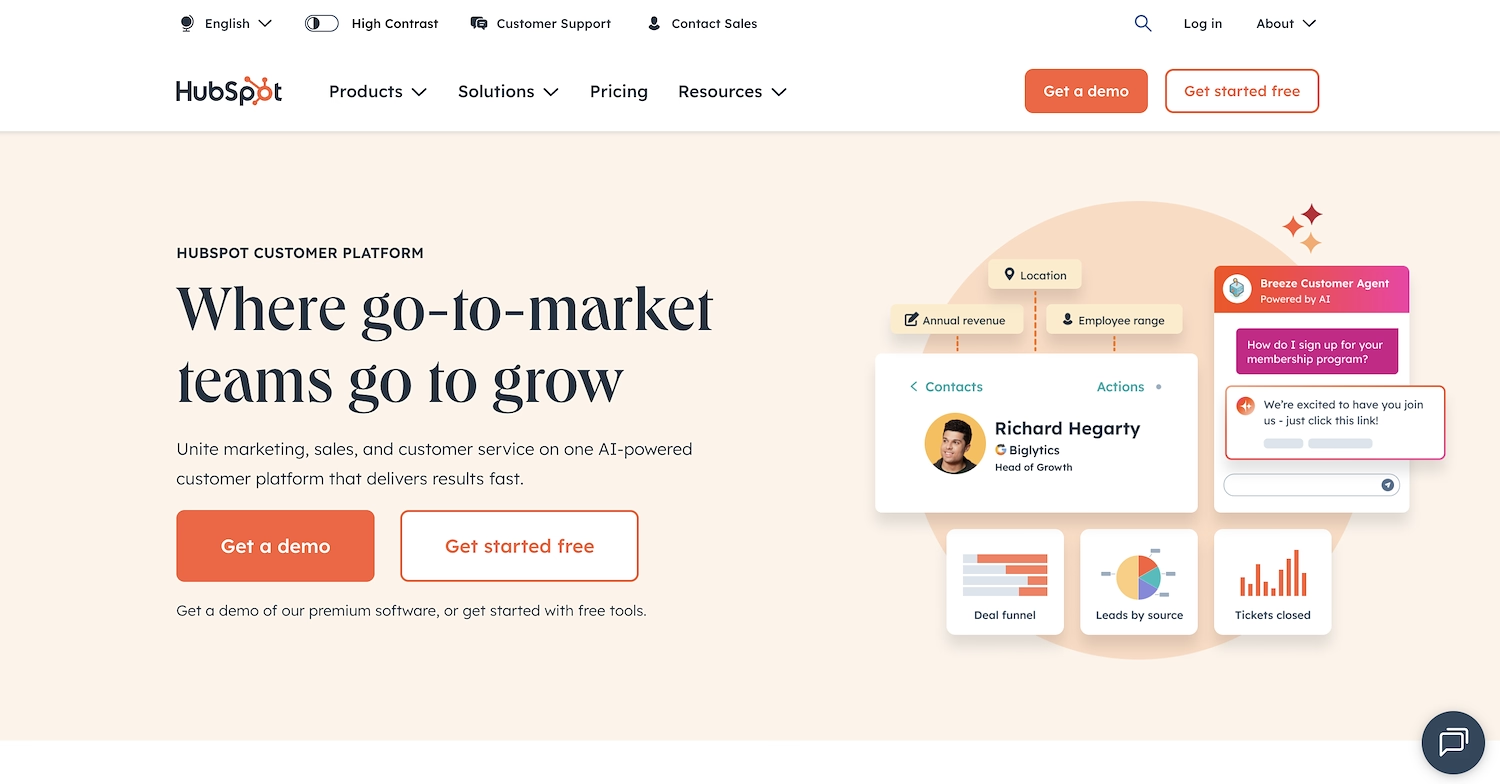
HubSpot Sales Hub is an AI-powered sales platform. It unites tools for prospecting, deal management, CPQ, and reporting in a single workspace. The software helps reps build pipelines and manage the entire deal journey, from quotes to payments, within one system.
It can run on HubSpot’s Smart CRM or integrate with an existing one. Leaders gain the visibility to forecast revenue and scale operations. The platform can replace multiple point tools with its all-in-one design, which connects to over 1,700 marketplace apps.
HubSpot Sales Hub's Main Features
- Includes a 24/7 AI chat agent to answer prospect questions and an autonomous agent for lead research and personalized outreach.
- Provides tools for the entire deal journey, including quote creation, e-signatures, payments, and recurring revenue tracking.
- Offers conversation intelligence with call transcription and insights, plus AI-powered forecasting and predictive lead scoring.
How HubSpot Sales Hub Compares to Membrain
Average Review Score: 4.4/5 stars based on 12,407 G2 reviews
- HubSpot Sales Hub includes AI agents for tasks like lead research and initial outreach. This automates top-of-funnel activities, which differs from Membrain's focus on guiding reps through a manual sales process.
- The platform unifies sales, marketing, and customer service tools in one system. This provides a complete customer view, unlike Membrain, which concentrates on sales process management.
- It offers native tools for the full deal cycle, from quote creation to payment processing. This is a broader scope than Membrain's core design, which centers on sales methodology and coaching.
- The tool is built on a free CRM and connects with over 1,700 marketplace apps. This offers more flexibility for a tech stack compared to Membrain's more self-contained system.
Potential Drawbacks Compared to Membrain
- HubSpot Sales Hub offers a flexible environment where teams create their own sales process. This contrasts with Membrain, which provides a pre-built sales methodology and coaching framework out of the box.
- The platform's all-in-one design for sales, marketing, and service can be complex for some teams. An organization that needs a tool purely for sales process execution may find Membrain's focused approach more suitable.
- It does not have Membrain's native tools for complex B2B sales, such as stakeholder mapping. Teams that manage intricate deals with multiple decision-makers might find Membrain's specific features more helpful.
Pricing and Cost Considerations
HubSpot Sales Hub offers transparent pricing, with plans ranging from $20 to $150 per user per month. In contrast, Membrain does not list its pricing publicly and requires a custom quote. This makes HubSpot a more predictable option for teams needing clear costs, while Membrain's model is likely better for organizations seeking a tailored package.
3) Pipedrive
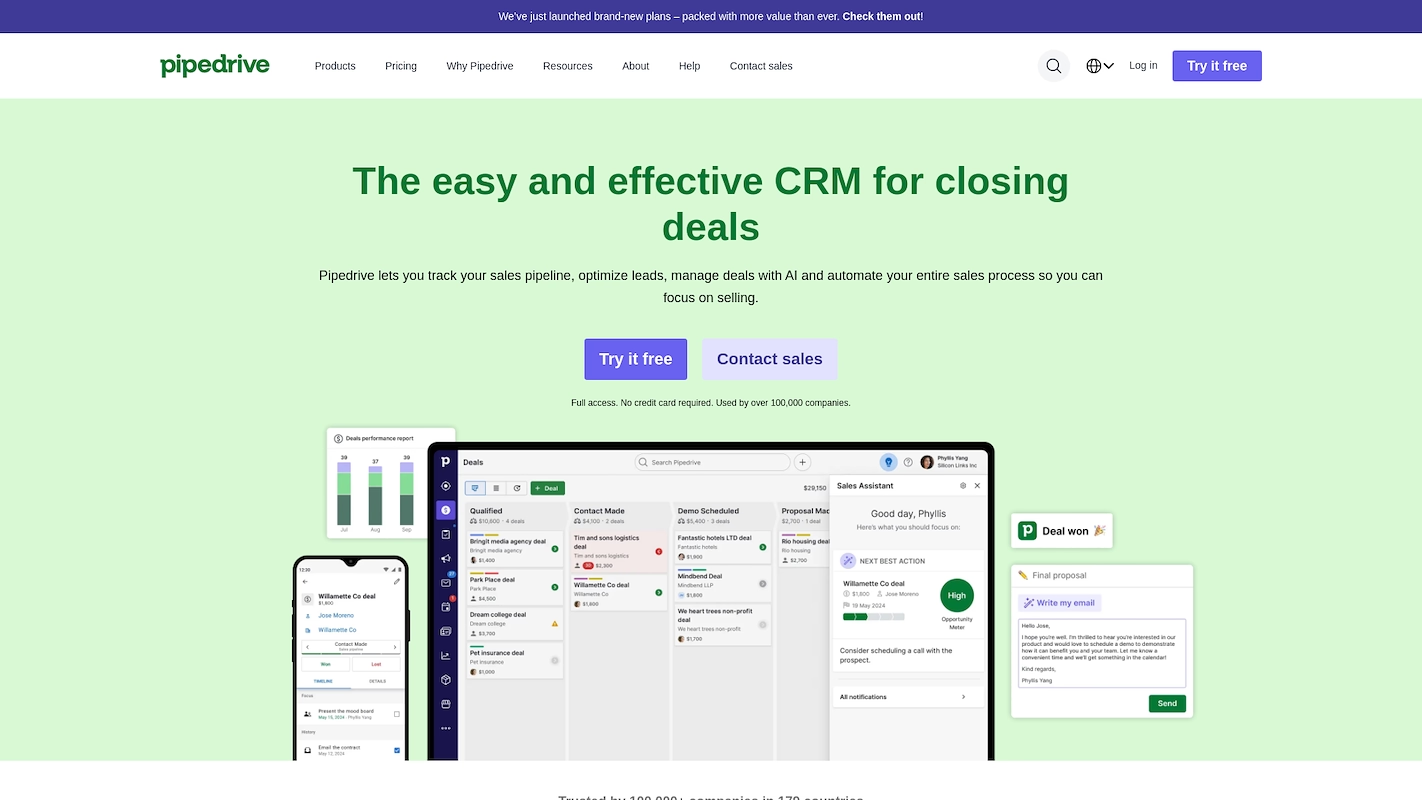
Pipedrive is a CRM platform built for sales teams to track pipelines and manage deals. It uses a visual, kanban-style interface and automates repetitive work. The system provides AI-powered guidance to help teams prioritize high-value deals and centralizes customer data in one workspace.
The tool helps organizations nurture leads, automate follow-up tasks, and generate real-time sales forecasts for management.
Pipedrive's Main Features
- Provides an AI Sales Assistant with deal-win predictions and workflow automation for tasks like lead routing.
- Automates multi-step email sequences and offers two-way email sync for up to five accounts.
- Connects with over 500 integrations through its marketplace and includes an open API for custom extensions.
How Pipedrive Compares to Membrain
Average Review Score: 4.3/5 stars based on 2,573 G2 reviews
- Pipedrive provides a visual, drag-and-drop pipeline that many teams find intuitive for tracking deals. This is different from Membrain's focus on a more rigid, methodology-driven process framework.
- The platform includes an AI Sales Assistant that offers deal-win predictions to help prioritize sales activities. This contrasts with Membrain, which centers on its built-in coaching tools to guide seller actions manually.
- It offers a marketplace with over 500 integrations and an open API for custom connections. This allows for more flexibility in a tech stack than Membrain’s more self-contained system.
- The tool automates multi-step email sequences and syncs with up to five email accounts per user. This provides a different kind of automation compared to Membrain's focus on process compliance.
Potential Drawbacks Compared to Membrain
- Pipedrive does not have the same focus on sales methodology and coaching as Membrain. For example, Membrain includes tools to enforce a sales process, which is a different approach from Pipedrive's flexible pipeline management.
- It does not include native tools for complex B2B sales, such as stakeholder mapping. In contrast, Membrain offers specific features designed to manage deals with multiple decision-makers and intricate buying processes.
- Some users report that Pipedrive's reporting features can be less robust for certain needs. Membrain's analytics are built around its sales process, offering specific insights on methodology compliance that Pipedrive does not.
Pricing and Cost Considerations
Pipedrive offers transparent pricing plans from $24 to $99 per user per month. This contrasts with Membrain's custom quote model, making Pipedrive's costs predictable for teams that need a clear budget, while Membrain's approach is suited for organizations requiring a tailored package.
4) Zoho CRM
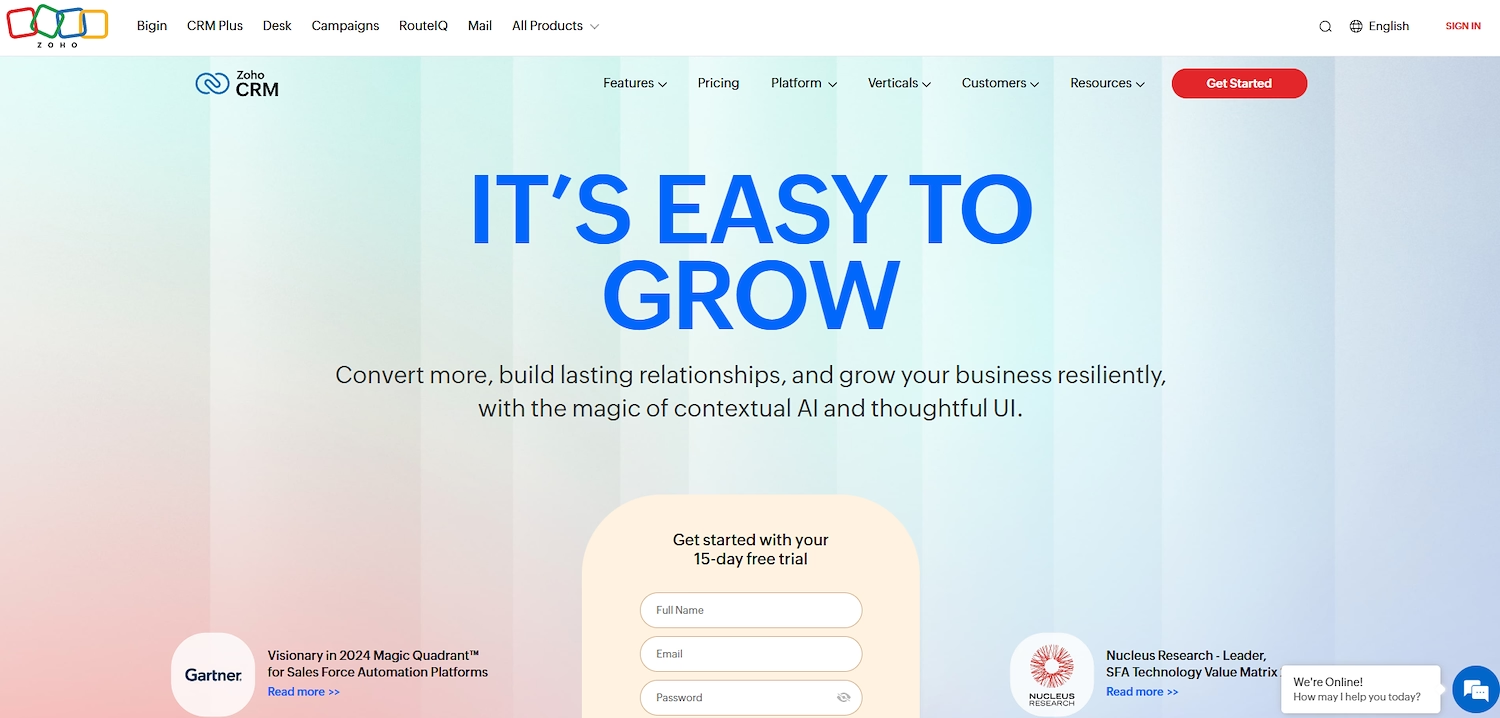
Zoho CRM is a platform for customer relationship management that connects sales, marketing, and support teams. This unification provides a 360-degree view of the business and helps manage the entire customer lifecycle from a single interface.
For sales motivation, the platform offers gamification tools. Reps can compete in contests and earn rewards for performance, which helps drive sales activity.
Zoho CRM's Main Features
- Includes Zia AI for email rewriting, anomaly detection, and predictive insights.
- Offers a drag-and-drop UI customizer, the Canvas Design Studio, that generates layouts from images.
- Provides dedicated work areas called Teamspaces, so each department sees only the data it needs.
How Zoho CRM Compares to Membrain
Average Review Score: 4.1/5 stars based on 2,820 G2 reviews
- Zoho CRM unifies sales, marketing, and support tools on one platform. This provides a full customer lifecycle view, which is different from Membrain's specific focus on sales process execution.
- It includes an AI assistant, Zia, that offers predictive insights and detects anomalies. This automated guidance contrasts with Membrain's framework, which relies on built-in coaching tools for manual seller improvement.
- The platform offers sales gamification with contests and rewards to motivate reps. This approach to performance is different from Membrain, which uses process compliance and methodology adherence to drive results.
- Its Canvas Design Studio allows for deep UI customization with a drag-and-drop interface. This offers more layout flexibility compared to Membrain's more structured, process-oriented user interface.
Potential Drawbacks Compared to Membrain
- Zoho CRM lets teams design a sales process. It lacks Membrain's native tools that enforce process compliance, which may be a consideration for managers who prioritize methodology adherence.
- The platform may not offer the same support as Membrain for complex sales cycles. It lacks built-in features like stakeholder mapping to help manage deals with multiple decision-makers.
- Some users report the interface can feel cluttered as part of a large business suite. This is different from Membrain's focused user experience, designed specifically for sales process execution.
Pricing and Cost Considerations
Zoho CRM provides transparent pricing with a free plan and paid tiers ranging from $14 to $40 per user per month. This contrasts with Membrain's custom quote model. Zoho's approach offers predictable costs, while Membrain is better for organizations seeking a tailored package.
5) Microsoft Dynamics 365 Sales
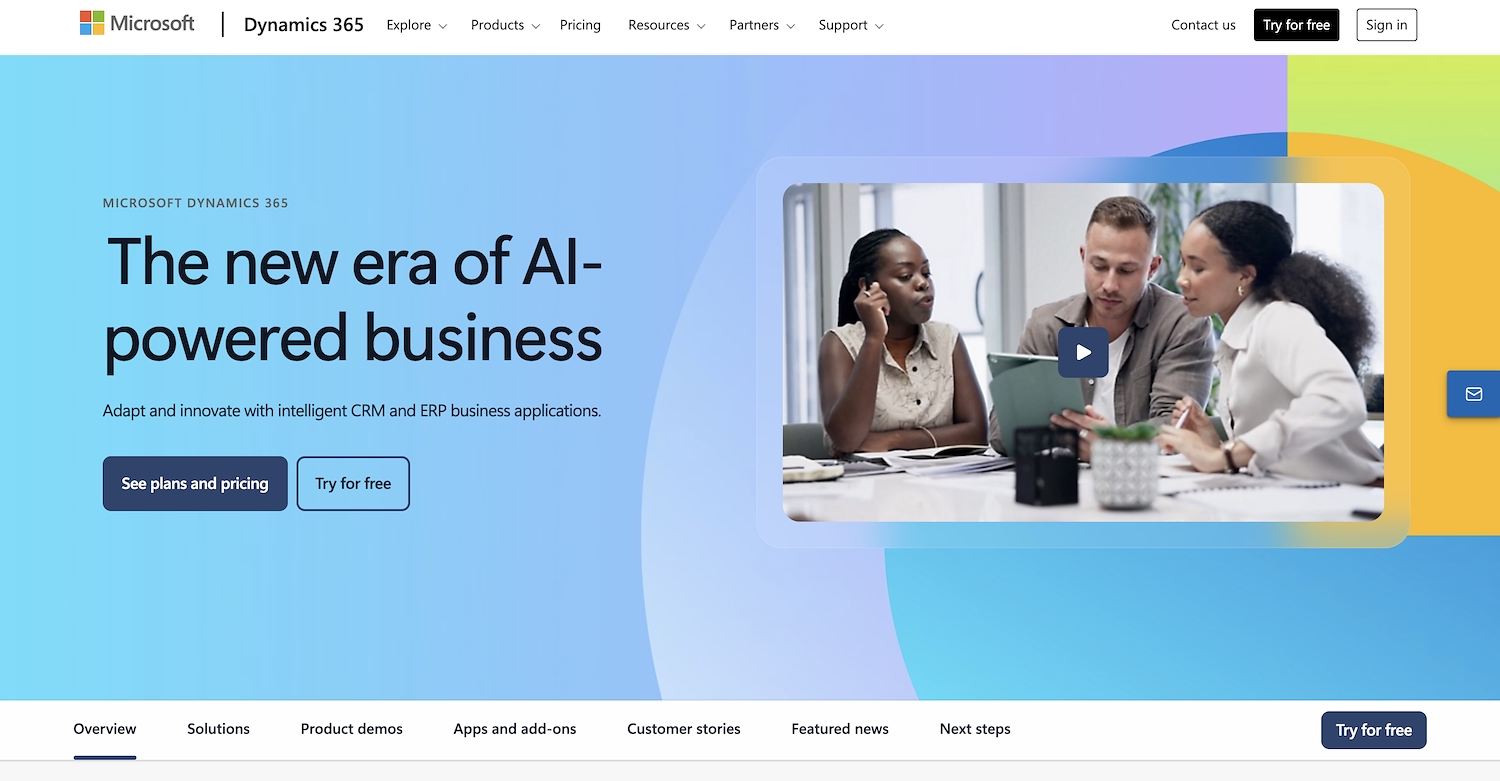
Microsoft Dynamics 365 Sales is a sales application to help sellers build customer relationships and close deals. It provides tools to manage sales pipelines and track performance against targets. The platform connects with other Microsoft products for a unified view of customer data, which supports team goals and sales incentives.
Microsoft Dynamics 365 Sales's Main Features
- Includes generative AI assistance (Copilot) for sales, marketing, service, ERP, and finance to provide real-time customer insights.
- Provides ERP and operations modules for finance, supply chain management, commerce, and project operations.
- Integrates with Microsoft 365, Teams, Power Platform, Azure, and IoT/Mixed-Reality devices.
How Dynamics 365 Sales Compares to Membrain
Average Review Score: 3.8/5 stars based on 1,602 G2 reviews
- Microsoft Dynamics 365 Sales includes a generative AI assistant, Copilot, for real-time insights. This is different from Membrain's focus on manual coaching tools to guide sellers.
- It integrates natively with the Microsoft ecosystem, including Teams and Power Platform. This provides a more unified workspace for companies using Microsoft products, compared to Membrain's more specialized, self-contained system.
- The platform provides ERP and operations modules for finance and supply chain management. This offers a broader business management scope than Membrain, which concentrates on sales effectiveness.
- Dynamics 365 Sales unifies sales, marketing, and customer service automation on one platform. This creates a single customer view, which is different from Membrain's specific focus on the sales process.
Potential Drawbacks Compared To Membrain
- Microsoft Dynamics 365 Sales requires teams to build their sales process from the ground up. This is different from Membrain, which provides a built-in framework to enforce a sales methodology.
- The platform does not include native tools for complex B2B sales, like stakeholder mapping. In contrast, Membrain offers specific features to help manage deals that involve many decision-makers.
- Some users report that the extensive feature set can be complex to learn. Teams that need a tool only for sales process execution might find Membrain's focused approach easier to adopt.
Pricing and Cost Considerations
Microsoft Dynamics 365 Sales has transparent pricing, with plans from $115 to $210 per user per month. Membrain requires a custom quote, making its costs less predictable upfront but potentially more tailored to specific company needs.
Consider 11x for Autonomous Sales Agents
If your goal is to add digital workers to your sales team, 11x offers a different path. Its autonomous agents handle repetitive tasks like lead research and outreach. This lets your sales reps focus on deal closure.
This model suits teams that want to automate sales activities, not just manage a process. If this approach matches your strategy, you can learn more about 11x and its AI agents.
At 11x, we use AI to run your sales playbook. Alice finds accounts and handles outreach, while Julian qualifies leads and schedules meetings. The platform consolidates tools for intent signals and email warmup, which removes the need for separate solutions.
Book a demo to see it in action.
6) Freshsales
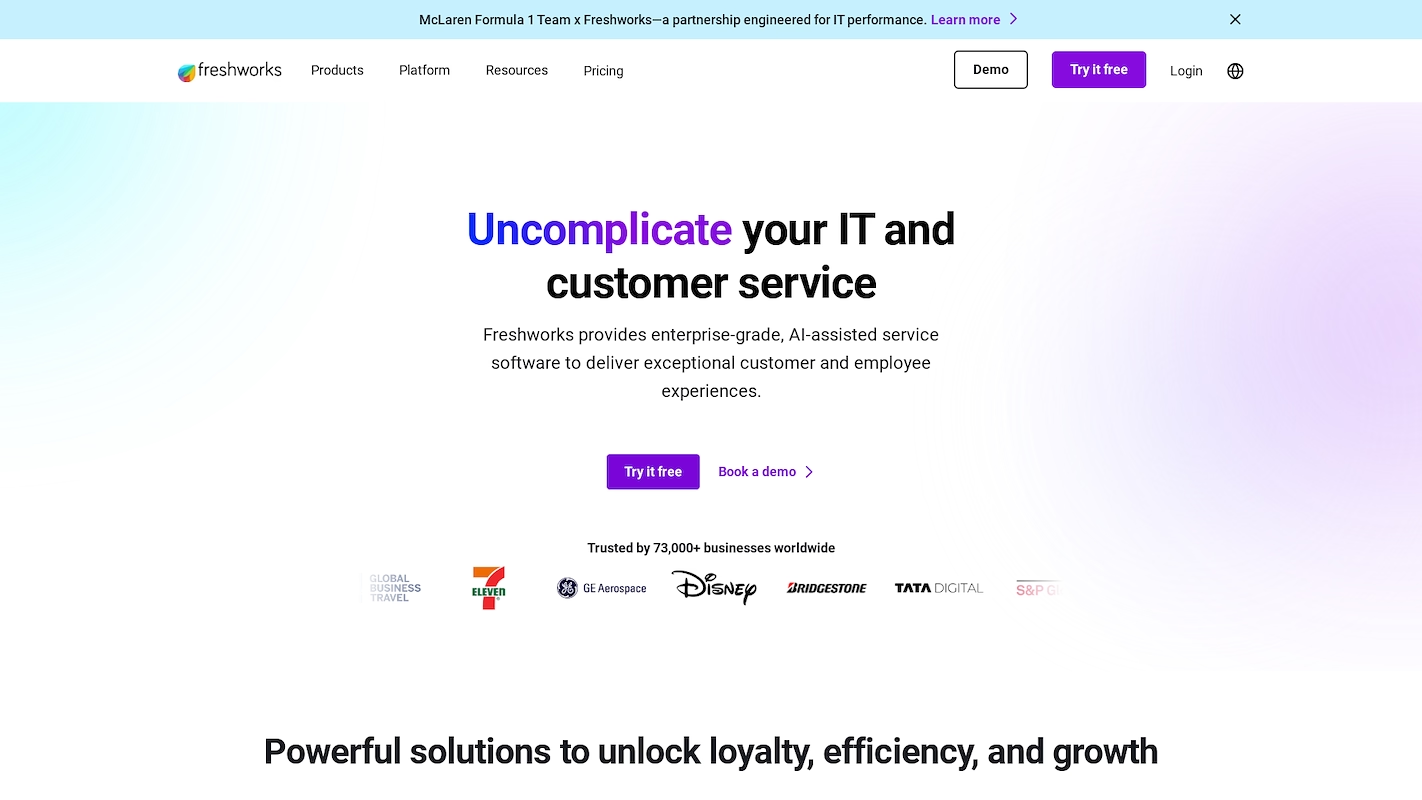
Freshsales is a CRM platform that unifies sales and marketing teams. It provides tools to manage contacts and deals from a single location. The system uses AI to help sales teams focus on the right deals and automates outreach with sales sequences.
This design helps reps to close deals with more speed and manage customer relationships. It connects sales activities with marketing efforts for a complete customer view.
Freshsales's Main Features
- Provides AI-driven lead management to run intelligent campaigns and track leads with Freddy AI.
- Engages prospects on their preferred channels with full context and provides intent scoring.
- Includes an AI assistant, Freddy AI, that drafts emails and provides always-on guidance.
- Offers a suite option that combines sales and marketing into a single unified CRM.
How Freshsales Compares to Membrain
Average Review Score: 4.5/5 stars based on 1,224 G2 reviews
- Freshsales includes an AI assistant, Freddy AI, that drafts emails and provides deal insights. This automated guidance is different from Membrain's focus on manual coaching tools.
- It offers a unified suite that combines sales and marketing tools. This provides a broader customer view compared to Membrain's specific focus on sales process execution.
- The platform provides built-in phone, email, and chat capabilities for prospect engagement. This is a different approach from Membrain, which centers on sales methodology rather than integrated communication channels.
- Its automation features, such as sales sequences, help automate outreach. This contrasts with Membrain's design, which emphasizes process compliance and manual execution by the sales team.
Potential Drawbacks Compared to Membrain
- Freshsales allows teams to build their own sales process. This flexibility may not suit managers who need to enforce a strict methodology, which is a core feature of Membrain's design.
- The platform lacks native tools for complex B2B sales, such as stakeholder mapping. In contrast, Membrain offers specific features to help navigate deals that involve many decision-makers.
- It relies on AI for sales guidance. This is different from Membrain, which provides a built-in coaching framework for managers to actively develop seller skills based on process compliance.
Pricing and Cost Considerations
Freshsales offers transparent pricing plans from $9 to $59 per user per month. This contrasts with Membrain's custom quote model, which does not have public pricing. Freshsales provides predictable costs, while Membrain's approach is suited for organizations that need a tailored package.
7) Salesloft
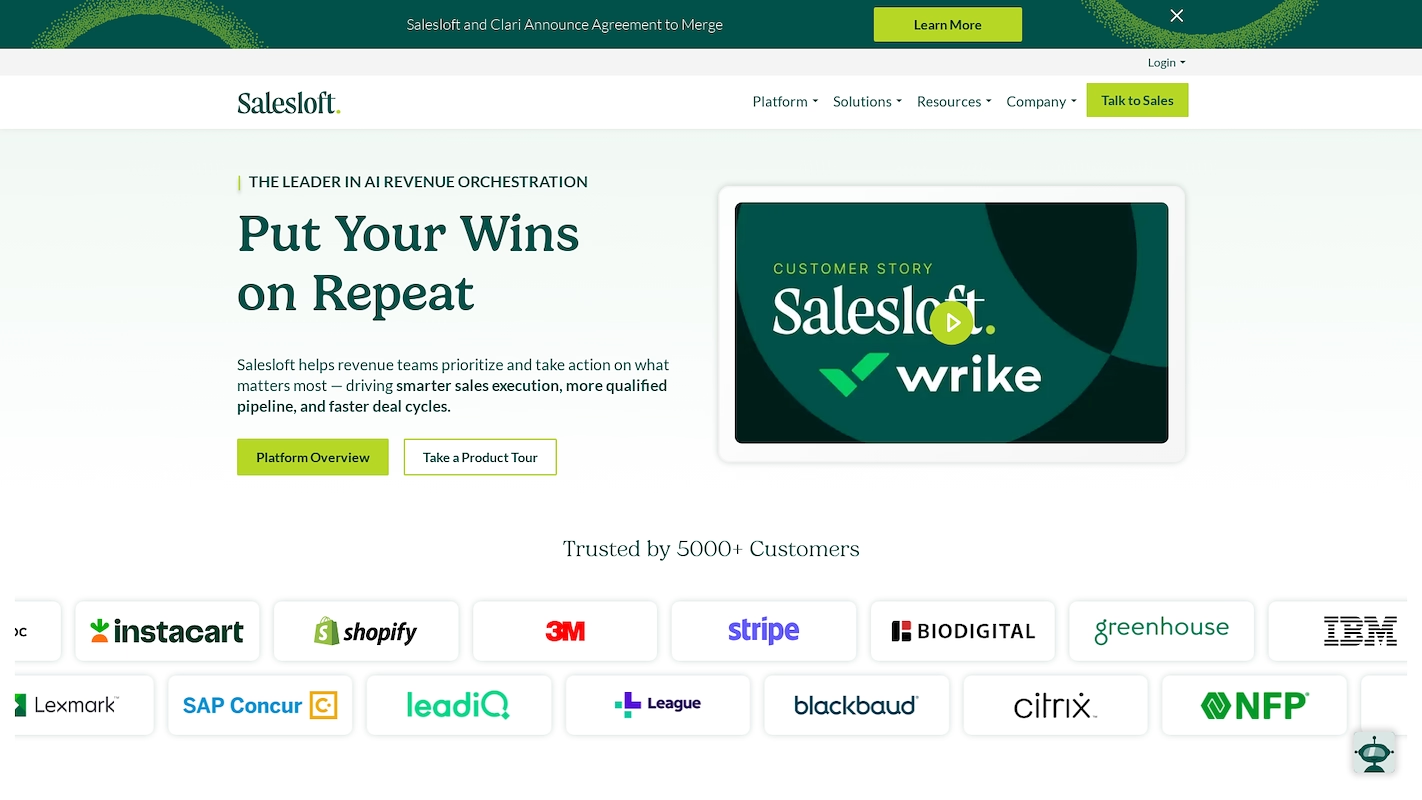
Salesloft is a revenue workflow platform with tools for the complete sales cycle. It helps teams build pipeline, manage deals, and forecast revenue. The system offers a module for seller development that replicates the actions of top performers across the team.
Salesloft's Main Features
- The platform provides automated, structured workflows to build pipeline, nurture leads, and manage renewals.
- An AI prioritization engine called Rhythm recommends the right actions for sellers at the right moments.
- It includes AI chat agents that engage website visitors with real-time, personalized conversations.
- The system uses outcome-first AI agents to automate, optimize, and scale sales processes.
How Salesloft Compares to Membrain
Average Review Score: 4.5/5 stars based on 4,145 G2 reviews
- Salesloft uses an AI prioritization engine, Rhythm, to recommend actions for sellers. This is different from Membrain, which relies on its built-in coaching framework for manual guidance.
- The platform offers automated workflows to build pipeline and manage renewals. This approach contrasts with Membrain's focus on enforcing a sales methodology through manual process compliance.
- It includes AI chat agents that engage website visitors in real-time conversations. Membrain does not offer this feature, as it centers on internal sales process management.
- This tool provides a seller development module that helps replicate the actions of top performers. This is a different approach to coaching than Membrain's system, which focuses on manager-led guidance and process adherence.
Potential Drawbacks Compared To Membrain
- Salesloft allows teams to build their own sales process. This is different from Membrain, which has built-in tools to enforce a specific sales methodology and ensure process compliance.
- The platform does not include native tools for complex B2B sales, such as stakeholder mapping. In contrast, Membrain offers specific features to help manage deals that involve many decision-makers.
- Its coaching features focus on AI recommendations and replicating top performers. This differs from Membrain's approach, which provides a framework for managers to coach sellers based on process adherence.
Pricing and Cost Considerations
Salesloft does not list its pricing publicly, requiring a custom quote. This model is similar to Membrain's, which also requires direct contact for a tailored price based on specific organizational needs.
8) Outreach
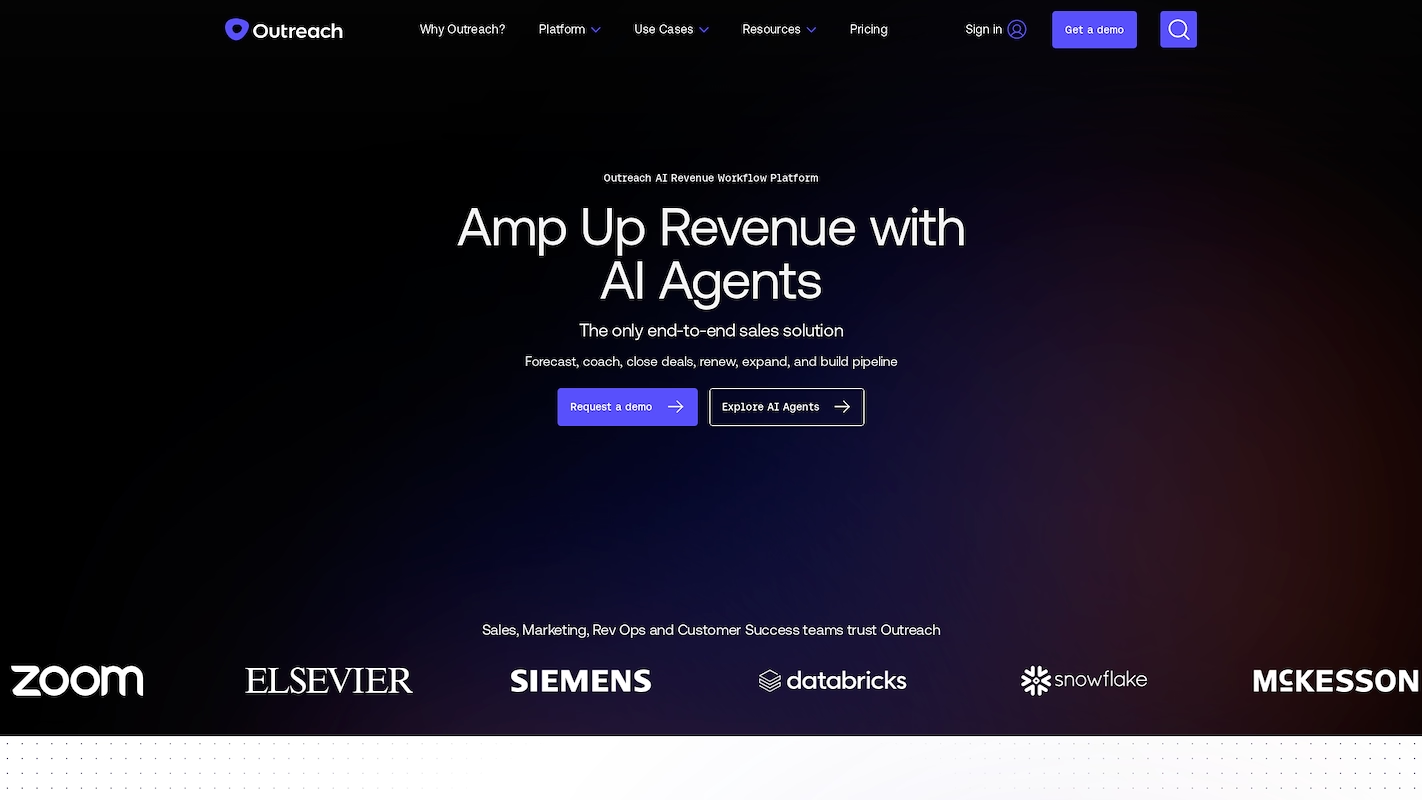
Outreach is a sales execution platform that helps teams manage the full revenue cycle. It provides tools to run sales plays, manage deals, and forecast results from a single workspace.
The system uses AI to guide seller actions and automate workflows. This approach can support sales motivation, as it gives reps a clear path to their targets and removes manual tasks.
Outreach's Main Features
- The platform leverages automation and AI to guide sellers and manage workflows across the revenue cycle.
- It unifies sales engagement, revenue intelligence, and revenue operations functionalities in a single platform.
- The system provides tools for prospecting, deal management, and forecasting to help close pipeline predictably.
How Outreach Compares To Membrain
Average Review Score: 4.3/5 stars based on 3,479 G2 reviews
- Outreach uses AI and automation to guide sellers through the revenue cycle. This approach differs from Membrain, which uses a manual coaching framework to ensure process compliance.
- It unifies sales engagement, revenue intelligence, and operations in one platform. This provides a broader toolset compared to Membrain's specific focus on sales process management.
- The platform provides tools for the entire sales cycle, including prospecting and forecasting. This offers a wider scope than Membrain, which centers on the execution of a defined sales methodology.
- This tool helps teams design and automate workflows to close deals predictably. This is a different approach from Membrain, which enforces a specific sales process to guide reps.
Potential Drawbacks Compared To Membrain
- Outreach allows teams to design their own sales process. This may not suit managers who need to enforce a strict methodology, which is a core feature of Membrain's design.
- It does not include native tools for complex B2B sales, such as stakeholder mapping. In contrast, Membrain offers specific features to help manage deals that involve many decision-makers.
- The tool's coaching features focus on AI recommendations. This differs from Membrain's system, which gives managers a framework to coach sellers based on process compliance and skill development.
Pricing and Cost Considerations
Outreach does not list its pricing publicly, requiring a custom quote. This model is similar to Membrain's, which also requires direct contact for a tailored price based on specific organizational needs.
9) Monday Sales CRM
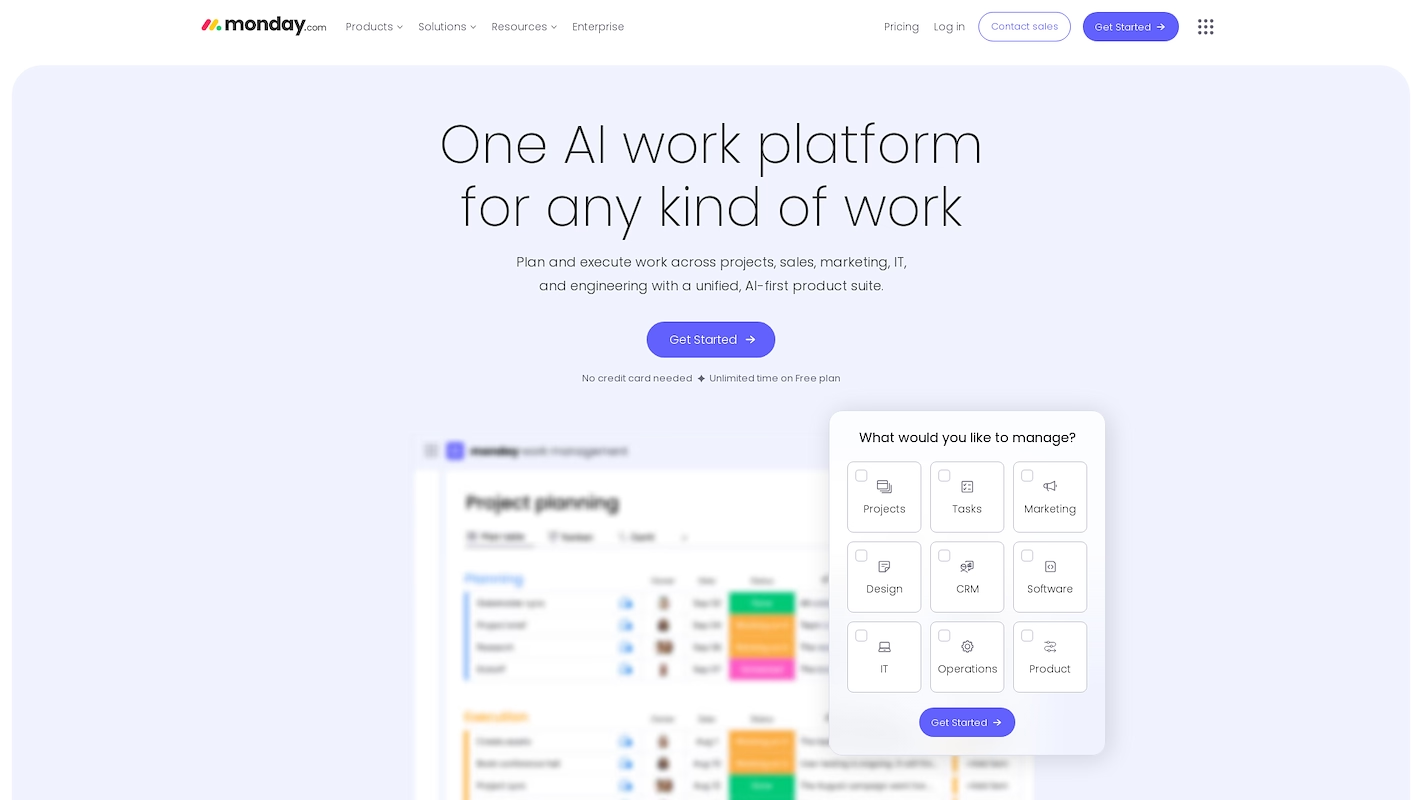
Monday Sales CRM is a platform to manage all aspects of the sales cycle. It centralizes customer data, communication, and activities in one visual workspace. The system helps teams build custom workflows and automate tasks to support their process.
This structure provides a clear view of the sales pipeline. Teams can track progress against goals, which can support sales motivation and team alignment.
Monday Sales CRM's Main Features
- Provides no-code customization and automations to adapt the CRM to a team's sales process.
- Includes AI capabilities such as an email generator, sentiment analysis, and forecasting.
- Centralizes customer information and connects with over 500 integrations.
How Monday Sales CRM Compares to Membrain
Average Review Score: 4.6/5 stars based on 973 G2 reviews
- Monday Sales CRM provides no-code customization to adapt the platform to a team's specific process. This offers more flexibility compared to Membrain's structured, methodology-first framework.
- The platform connects with over 500 integrations, which allows for a more connected tech stack than Membrain’s more self-contained system.
- It includes AI features like an email generator and sentiment analysis. This is a different approach to seller assistance compared to Membrain's manual coaching tools.
- This tool is part of a larger work management platform, allowing organizations to manage processes beyond sales in one place. This is a broader scope than Membrain's focus on sales execution.
Potential Drawbacks Compared To Membrain
- The platform's high degree of customizability means teams must construct their sales process. Some managers might find this less direct than Membrain's approach, which provides a structured sales methodology to guide reps from the start.
- It may not provide the same level of support for complex B2B sales cycles. For instance, Membrain includes native tools like stakeholder mapping to navigate deals with many decision-makers, a feature not central to Monday Sales CRM's design.
- Its guidance for sellers comes from AI features like sentiment analysis. This automated assistance is a different philosophy from Membrain, which equips managers with a specific framework to coach reps on sales process execution and skill development.
Pricing and Cost Considerations
Monday Sales CRM offers transparent pricing, with plans ranging from $12 to $28 per user per month. This contrasts with Membrain's custom quote model, which does not have public pricing. Monday's approach provides predictable costs, while Membrain is better suited for organizations that require a tailored package.
10) Copper
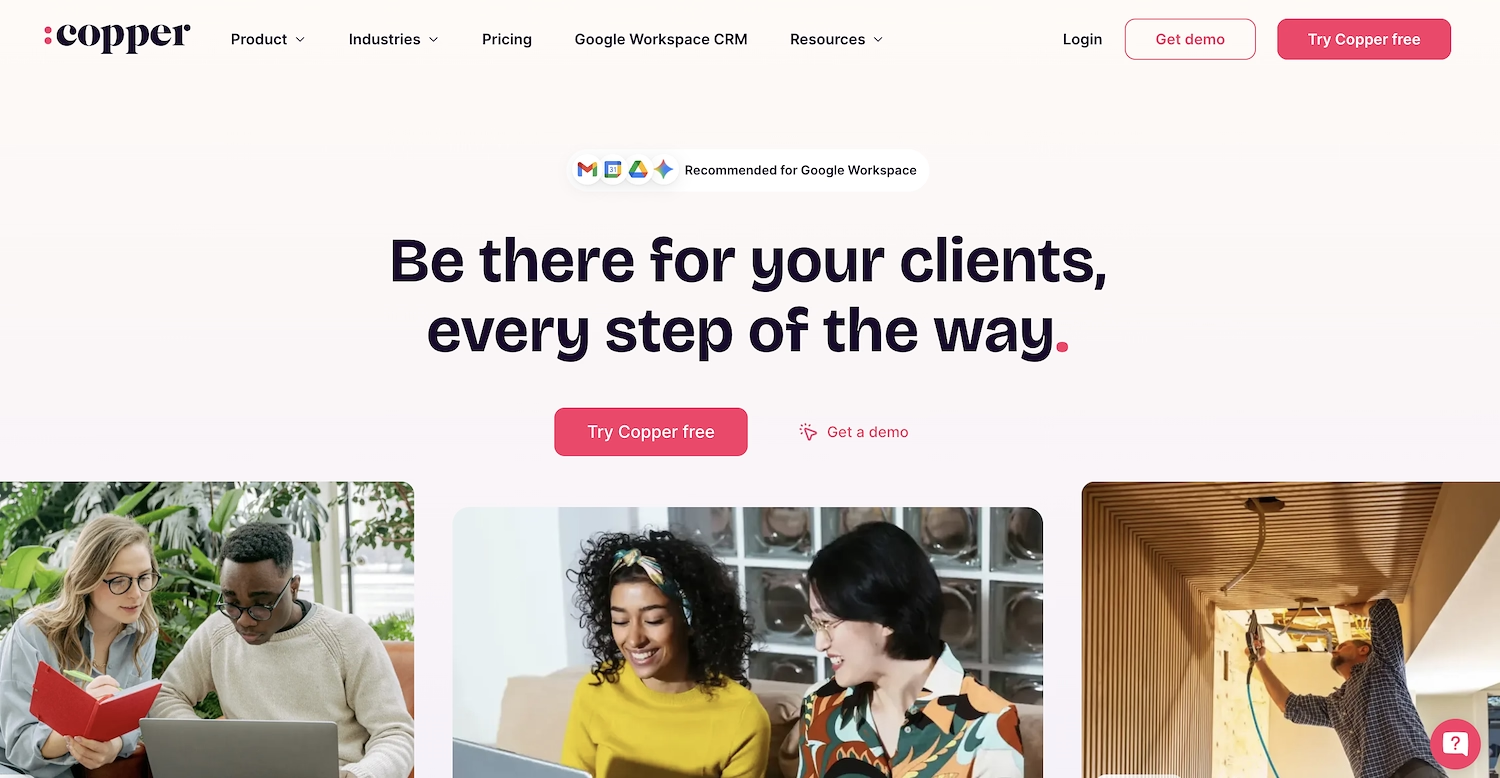
Copper is a CRM for Google Workspace that works from the Gmail inbox. Teams use it to manage deals and contacts without a separate application. The system automates data entry for contacts and emails.
This design lets sales reps focus on customer relationships, not manual tasks. Because the interface is familiar, it requires no special training and supports team adoption.
Copper's Main Features
- It integrates directly into Google Workspace, allowing teams to manage contacts and track emails from the Gmail inbox.
- The system automates data entry by syncing contacts, emails, and files from Google Workspace applications.
- It includes project delivery pipelines to manage client onboarding and tasks after a deal is won.
- A custom report builder exports data directly to Google Sheets or connects to Looker Studio for visualization.
How Copper Compares To Membrain
Average Review Score: 4.5/5 stars based on 1,139 G2 reviews
- Copper works inside the Gmail inbox due to its deep Google Workspace integration. This differs from Membrain, which is a standalone platform that requires switching between applications.
- The tool automates data entry by syncing information from Google Workspace. This approach contrasts with Membrain, where reps manually enter data as part of the sales process.
- It includes project delivery pipelines to manage post-sale activities like client onboarding. This provides a different scope than Membrain, which centers on the pre-sale process.
- A custom report builder exports data to Google Sheets and Looker Studio. This offers a different kind of reporting flexibility than Membrain's internal analytics, which focus on process compliance.
Potential Drawbacks Compared To Membrain
- Copper provides a flexible sales pipeline, which may not suit teams that need to enforce a strict sales methodology. It lacks Membrain's built-in tools for process compliance and enforcement.
- It lacks native tools for complex B2B sales, like stakeholder mapping. Membrain offers specific features designed to help reps navigate deals that involve many decision-makers and buyers.
- The platform's design centers on automation within Google Workspace. It does not include a dedicated coaching framework for managers, a feature that is central to Membrain's approach to seller development.
Pricing and Cost Considerations
Copper offers transparent pricing plans, with tiers ranging from $9 to $99 per user per month. This contrasts with Membrain, which requires a custom quote. Copper's model provides predictable costs, while Membrain's is suited for organizations that require a tailored package.
Which One Should You Go With?
Many variables factor into the choice of a Membrain alternative, from sales process complexity to budget. This guide shared several options to help you decide which tool best fits your organization's needs.
If your strategy involves automating sales activities, 11x offers a different model. Its autonomous agents handle tasks like lead research and outreach, which lets your sales team focus on closing deals. This approach adds digital workers to your GTM motion.



